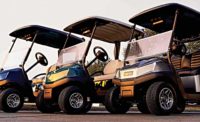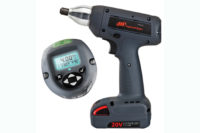Quality and innovation have been the name of the game at Club Car ever since the company was founded in 1958. Today, the company produces 40 base models of golf, utility and transportation vehicles.
A business unit of Ingersoll Rand, Club Car manufactures its products at an assembly plant in Augusta, GA. The manufacturing team is continuously on the lookout for new and better ways to build Club Car products and meet customer expectations. A cornerstone of the company’s success is its passion for superior quality, productivity and employee health and safety.
For decades, Club Car manufacturing employees have successfully used pneumatic and direct-current hand tools to tighten the thousands of fasteners of various sizes and types that are used to assemble a typical car. In the hands of skilled assemblers, air and DC tools have gotten the job done on tens of thousands of cars. However, pneumatic and DC tools are not right for every application.
That’s why Club Car manufacturing leaders began exploring new options for assembly tools. After researching several brands of cordless electric power tools, Club Car decided to go with the QX Series of tools from Ingersoll Rand to address various challenges in the manufacturing process.
For example, the Club Car manufacturing team identified access to some fastened joints as a particular challenge. Access problems arise when operators have difficulty reaching certain fasteners on the car they are assembling. This often occurs because assemblers are encumbered by air hoses and electrical cords, which can make it tough to work in tight spaces. This is particularly true for two-handed tasks, when the operator needs to hold the power tool in one hand and a wrench in the other to install the fastener.
Access is also a problem in a special staging area for cars that have already been assembled. The area is used to attach canopies to cars, customize cars to meet customer requirements, refurbish fleet vehicles, and perform rework to correct minor quality problems. Since the area is located outside the factory, it cannot be accessed with conventional pneumatic or electric tools.
Ergonomics is another priority for Club Car, which has a well-established culture of worker health and safety. The company goes above and beyond to help employees avoid repetitive motion injuries. This objective is made more challenging by the fact that conventional hand tools are often heavy and their connections to electric or air lines sometimes require operators to assume awkward physical positions to tighten hard-to-reach fasteners. Additionally, tethered tools connected to lines above the balancers hang overhead, making them a potential hazard.
Over the years, the Club Car assembly process has evolved and the company has discovered new ways to make sure that every car rolling off the line is as good as it can be. After careful study, the manufacturing team determined that air and DC electric tools do not provide a “one size fits all” solution. Other options needed to be considered to ensure continuous improvement in quality, cost, productivity and safety.
The Solution
The Club Car manufacturing team began investigating cordless electric tools for use on select areas of the assembly line. After considering several options, Club Car agreed to purchase beta units for a newly developed family of handheld “smart” tools—the QX Precision Fastening System—developed by Ingersoll Rand.
Designed to help users improve productivity, lower operating costs and increase quality, the QX Series includes unique technological features in an affordable, lightweight package. The family of tools includes precision screwdrivers, “haz tools” (tools that can safely be used in hazardous environments), and angle wrenches.
Features include:
- A closed-loop transducer control that delivers precise torque and accurate, traceable results.
- A multifunction display module that allows for quick setup and feedback on every tool.
- Eight user-programmable configurations for torque, angle and speed—enabling one tool to do the work of eight.
- A compact, lightweight and ergonomically balanced design that enables operators to work without the constraint of air hoses or power cords.
- A wireless communications option using a dedicated process communications module (PCM) to integrate tools into a factorywide network and enable configuration adjustments remotely and in real time.
The Results
Working closely with the Club Car manufacturing team, Ingersoll Rand representatives conducted a wide-ranging evaluation of the company’s manufacturing operation and helped the team decide where to introduce the new tools for maximum operational impact. The first applications were in the staging area for completed cars and on the powertrain feeder line. Today, close to 50 QX Series tools are used throughout Club Car’s assembly plant.
The Club Car manufacturing team has found the tools to be flexible and easy for operators to use. Use of the QX Series tools supports the organization’s quality initiatives by controlling torque and reducing variance so that fasteners are consistently tightened at the right speed and at the right torque. As a result, the team believes that more fasteners are installed correctly the first time, reducing the need for rework.
In addition, quality is bolstered by the fact that the QX Series software automatically counts fasteners as they are installed, ensuring traceability and reducing liability. If a fastener is missed, the tool notifies the user and the issue can be addressed before it becomes a quality problem.
“We love the QX Series tools and are trying every day to find new applications in our factory,” says Gerald Skelton, manufacturing engineer at Club Car. “The tools are extremely flexible and can be used in nondedicated operations where one QX tool can replace several air or DC tools. The QX tools have all the features we need and none of the features we don’t, making them extremely cost-effective.”
Several features of the QX Series improve throughput and continuous flow on the assembly line. For example, the fact that a single tool can handle various types of fasteners and that sockets can be changed quickly helps keep the line moving smoothly. In addition, traceability features of the tools enable the floor team to collect data throughout the manufacturing process and quickly handle rework at the end of the line.
In locations such as the staging area, operators often are required to address multiple types of fasteners with different torque requirements in quick succession. This is where the flexibility of the QX Series tools pays off. Changing the torque setting on a QX tool takes about 30 seconds; changing the setting on an air tool requires additional equipment and takes about 15 minutes. This time savings and accompanying productivity impact is quickly multiplied in an environment where as many as six joints are secured per minute.
“Torque accuracy and precision are extremely important to us,” says Doug Pugh, test engineer at Club Car. “We want the fasteners tight, but not too tight. We’ve added a PCM controller to control and record the torque, that way we can keep track of the fasteners for quality and liability purposes.”
The Club Car team has had positive feedback from operators about the ease of use of the QX tools on the factory floor. Operators have been especially vocal about the benefits of cordless tools. They have praised the long-life battery that enables them to work without the inconvenience of air hoses and power cords. A secondary benefit to cordless tools is that they also eliminate the overhead hazards of hanging air tools that inevitably led to a couple bruised foreheads each year. Operators also comment on how quiet the Club Car manufacturing line is since introducing the tools, whereas before, it was often challenging to carry on a conversation with a co-worker.
For more information, visit http://www.ingersollrandproducts.com/am-en/products/tools/fastening/cordless-fastening-systems.






